11 Best Herbal Teas For Gallstones
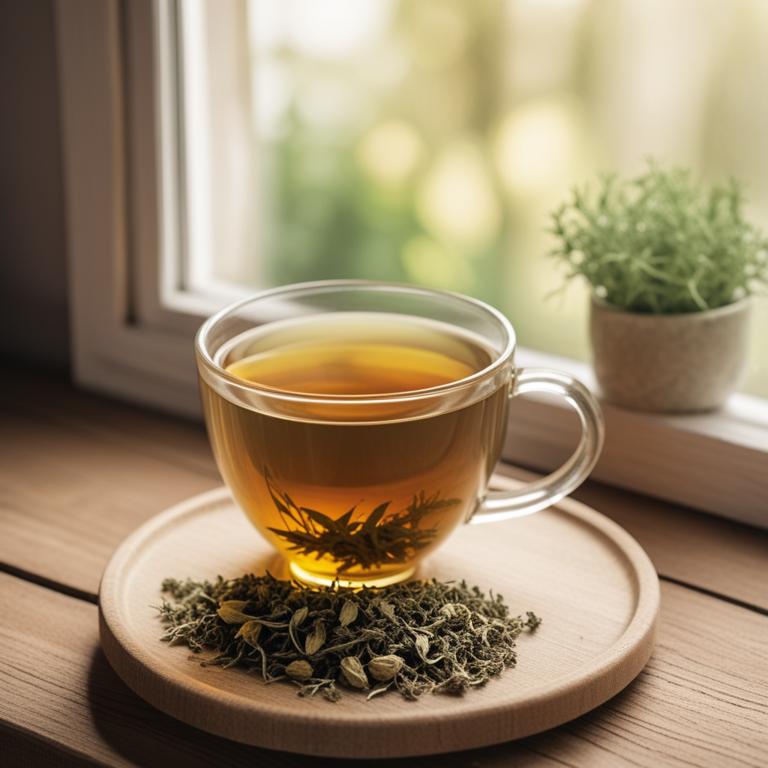
Herbal teas for gallstones are a type of natural remedy used to alleviate the symptoms and promote the healing of gallstones, which are small, hard deposits that form in the gallbladder.
These herbal teas offer numerous benefits, including reducing inflammation, improving digestion, and dissolving gallstones, making them a popular alternative to medical treatments.
Some of the most effective herbal teas for gallstones include dandelion root tea, milk thistle tea, and turmeric tea, which have anti-inflammatory properties that help to reduce pain and inflammation associated with gallstones.
Additionally, other herbal teas such as peppermint tea, ginger tea, and licorice root tea can also help to relax the muscles and improve digestion, further aiding in the treatment of gallstones.
According to "Alimentary pharmacology & therapeutics", teas for gallstones may be beneficial due to their potential to contain curcumin, which can induce contraction of the human gall-bladder, thus possibly reducing gallbladder volume.
Below there's a list of the 11 best herbal teas for gallstones.
- 1. Arctium lappa teas
- 2. Curcuma longa teas
- 3. Silybum marianum teas
- 4. Chamaemelum nobile teas
- 5. Zingiber officinale teas
- 6. Cynara scolymus teas
- 7. Equisetum arvense teas
- 8. Astragalus membranaceus teas
- 9. Foeniculum vulgare teas
- 10. Urtica dioica teas
- 11. Taraxacum officinale teas
Also you may be interested in...
TODAY'S FREE BOUNDLE
Herb Drying Checklist + Herbal Tea Shopping List + Medicinal Herbs Flashcards
Enter you best email address below to receive this bundle (3 product valued $19.95) for FREE + exclusive access to The Aphotecary Letter.
$19.95 -> $0.00
1. Arctium lappa teas
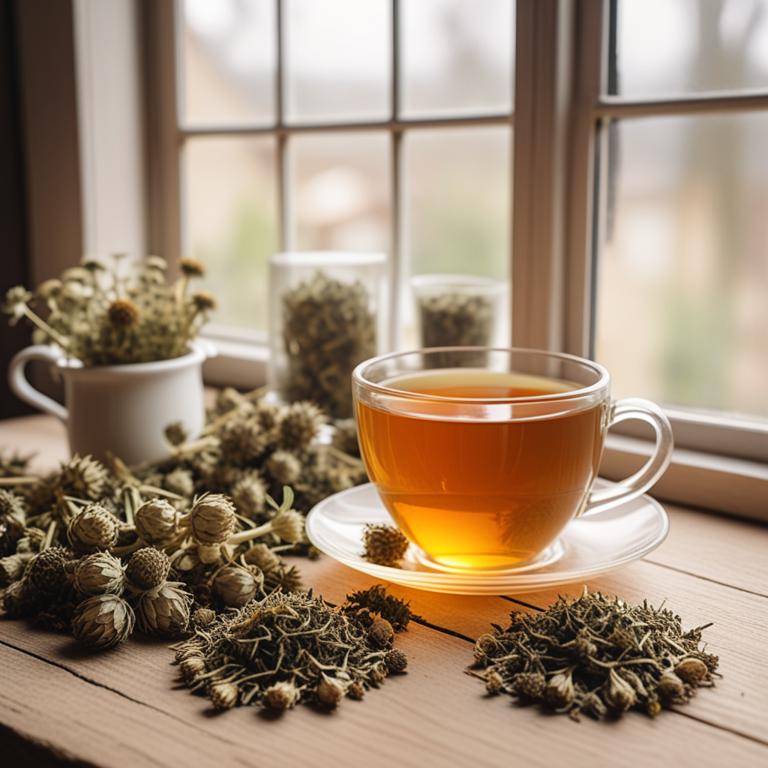
Arctium lappa teas have been traditionally used to treat gallstones, a condition characterized by the formation of small, hard deposits in the gallbladder.
The bioactive constituents of Arctium lappa, including arabinose, gallic acid, and inulin, possess anti-inflammatory and antioxidant properties that help to reduce inflammation and promote the dissolution of gallstones.
By stimulating the liver and gallbladder, Arctium lappa teas help to improve bile production and flow, which in turn aids in the dissolution and removal of gallstones from the body.
The benefits of using Arctium lappa teas to treat gallstones include improved digestion, reduced pain and discomfort, and a reduced risk of complications associated with the condition.
2. Curcuma longa teas

Curcuma longa teas, also known as turmeric tea, have been traditionally used to treat gallstones due to their potent anti-inflammatory and antioxidant properties.
The bioactive constituents of Curcuma longa, including curcumin, demethoxycurcumin, and bisdemethoxycurcumin, help to reduce inflammation and prevent the formation of gallstones by inhibiting the expression of pro-inflammatory enzymes and promoting the dissolution of gallstones.
The antioxidant properties of Curcuma longa teas also help to protect the liver and bile ducts from oxidative damage, reducing the risk of gallstone formation and recurrence.
The benefits of using Curcuma longa teas to treat gallstones include reduced symptoms, improved liver function, and a lower risk of complications, making it a promising natural remedy for this condition.
Related Study
According to "Alimentary pharmacology & therapeutics", Curcuma longa teas for gallstones may be beneficial as curcumin reduces gall-bladder volume, with percentage reductions of 11.8% to 29.3% after 0.5 to 2 hours of administration.
3. Silybum marianum teas

Silybum marianum teas, also known as milk thistle teas, have been traditionally used to treat gallstones and related ailments.
The herbal preparation's anti-inflammatory and antioxidant properties help to reduce gallbladder inflammation and prevent the formation of gallstones.
The bioactive constituents of milk thistle teas, including silymarin, flavonoids, and phenolic acids, are responsible for their therapeutic effects, which include improving bile flow and reducing oxidative stress.
The benefits of using Silybum marianum teas to treat gallstones include reduced symptoms, improved liver function, and a lower risk of complications associated with gallstones.
4. Chamaemelum nobile teas

Chamaemelum nobile teas, also known as chamomile tea, have been traditionally used to treat gallstones due to its anti-inflammatory and antioxidant properties.
The flavonoids and terpenoids present in chamomile tea, such as apigenin and luteolin, help to reduce inflammation and improve digestion, which in turn aids in the treatment of gallstones.
By relaxing the muscles in the gallbladder and improving the flow of bile, chamomile tea helps to prevent the formation of gallstones and alleviate symptoms associated with the condition.
The benefits of using chamomile tea to treat gallstones include reduced pain, improved digestion, and a lower risk of complications, making it a popular natural remedy for this ailment.
5. Zingiber officinale teas

Zingiber officinale teas, also known as ginger teas, have been traditionally used to treat gallstones due to their anti-inflammatory and antioxidant properties.
The bioactive constituents of ginger, including gingerols and shogaols, help to reduce pain and inflammation associated with gallstones, while also improving digestion and reducing bile stagnation.
Ginger teas work by stimulating the gallbladder to release bile, reducing the size of gallstones and preventing further formation, thereby alleviating symptoms such as abdominal pain and nausea.
Regular consumption of ginger teas has been shown to provide relief from gallstone symptoms and promote overall digestive health.
6. Cynara scolymus teas
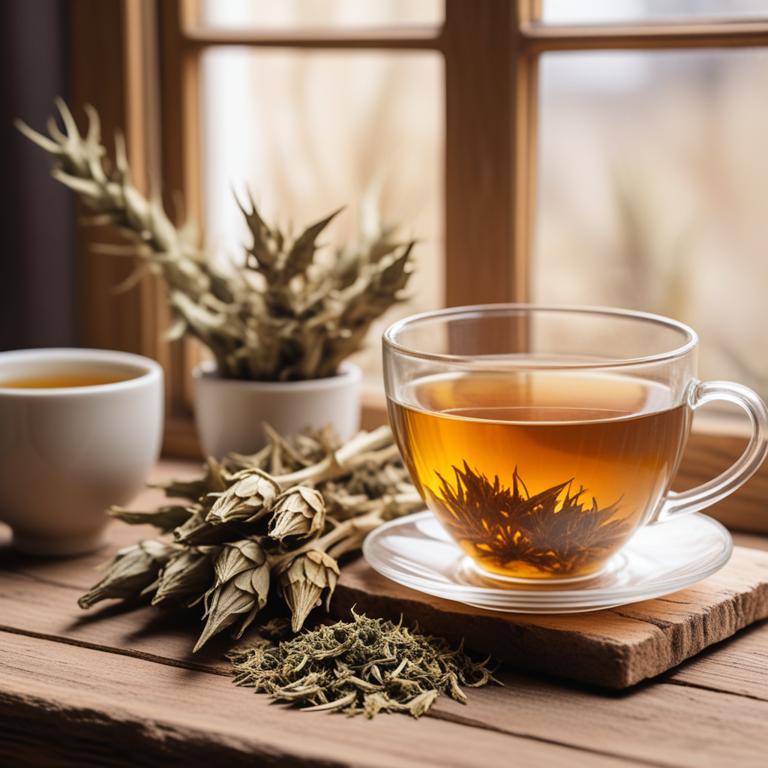
Cynara scolymus teas, also known as artichoke tea, have been traditionally used to treat gallstones due to their hepatoprotective and choleretic properties.
The tea helps to treat this ailment by stimulating bile production, improving liver function, and preventing the formation of gallstones.
The bioactive constituents of Cynara scolymus, including cynarin and silymarin, have been found to have antioxidant and anti-inflammatory effects, which contribute to its therapeutic benefits.
The benefits of using Cynara scolymus teas to treat gallstones include improved liver health, enhanced digestion, and reduced risk of complications associated with this condition.
7. Equisetum arvense teas
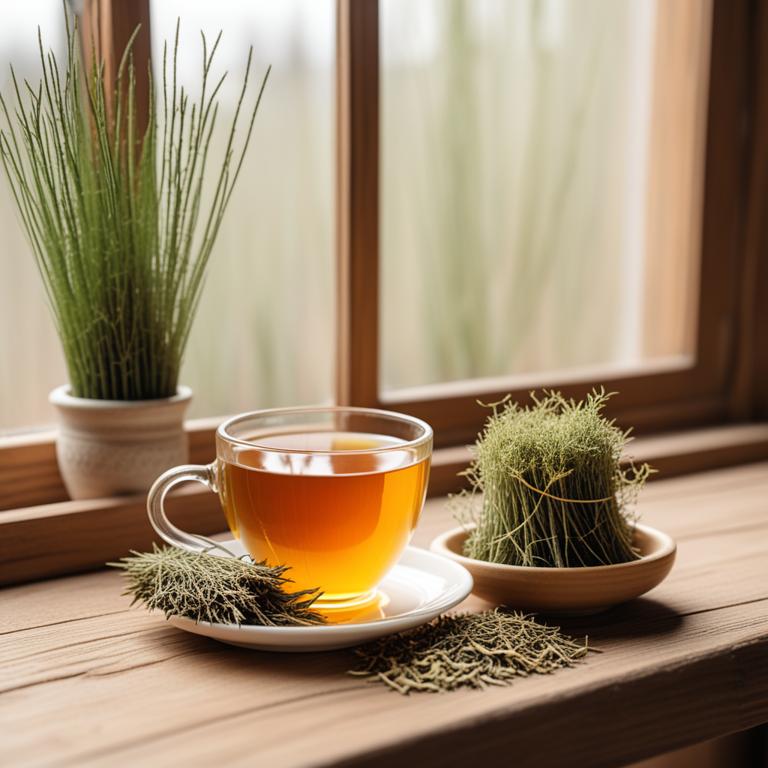
Equisetum arvense teas have been traditionally used to treat gallstones due to their unique properties that help to alleviate the symptoms associated with this condition.
The teas are rich in mucilages, saponins, and flavonoids, which work together to reduce inflammation and promote the dissolution of gallstones.
The bioactive constituents in Equisetum arvense teas, including isorhapontigenin and equisetic acid, help to break down the cholesterol and bilirubin stones, making it easier for the body to pass them out.
By drinking Equisetum arvense teas, individuals can benefit from improved liver function, reduced pain, and a lower risk of complications associated with gallstones.
8. Astragalus membranaceus teas
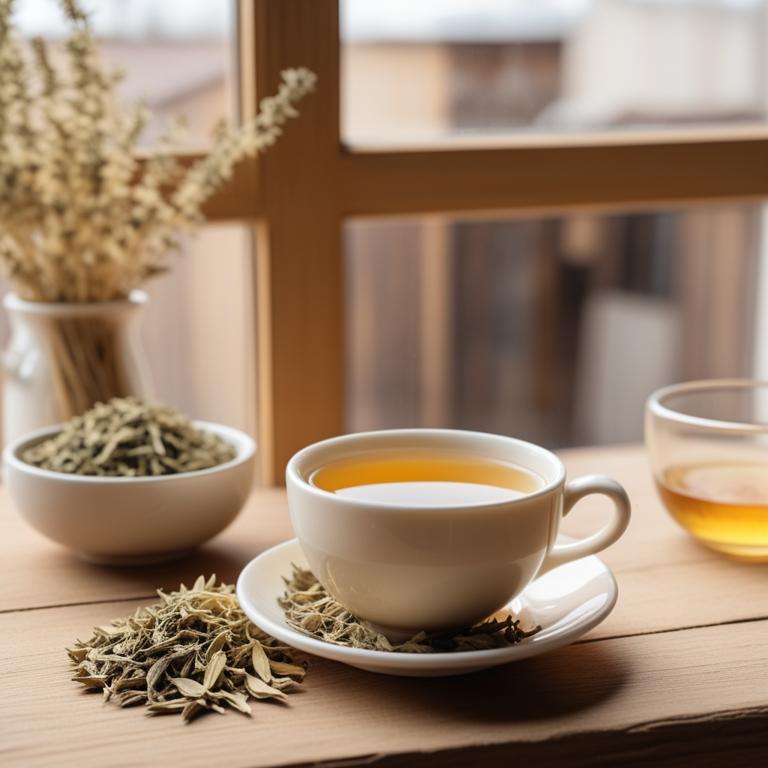
Astragalus membranaceus teas, also known as Huangqi tea, have been traditionally used to treat gallstones due to its unique properties.
The herbal preparation contains bioactive constituents such as flavonoids, saponins, and phenolic acids, which help to improve liver function and reduce inflammation, ultimately dissolving and removing gallstones.
Astragalus membranaceus teas work by stimulating the liver and gallbladder to produce bile and improve digestion, which helps to break down and eliminate gallstones.
The benefits of using Astragalus membranaceus teas to treat gallstones include reduced symptoms, improved liver function, and a lower risk of complications associated with gallstone disease.
9. Foeniculum vulgare teas

Foeniculum vulgare teas, also known as anise tea, have been traditionally used to treat gallstones due to their unique properties that help to alleviate this condition.
The herbal preparation's ability to stimulate digestion, reduce inflammation, and improve bile flow makes it an effective remedy for gallstones.
The bioactive constituents present in Foeniculum vulgare, such as anethole, limonene, and fenchone, are responsible for its therapeutic effects, including its ability to prevent the formation of gallstones and reduce the risk of gallstone attacks.
Drinking Foeniculum vulgare teas has been found to provide several benefits, including improved liver function, reduced pain and discomfort, and a lower risk of complications associated with gallstones.
10. Urtica dioica teas

Urtica dioica teas, also known as stinging nettle tea, have been traditionally used to treat various health issues, including gallstones.
The anti-inflammatory and antioxidant properties of this herbal preparation help to reduce inflammation and prevent further damage to the gallbladder.
The bioactive constituents, such as flavonoids and phenolic acids, in Urtica dioica teas are responsible for their therapeutic effects, which may include reducing gallstone formation and promoting gallbladder health.
The benefits of Urtica dioica teas in treating gallstones include promoting digestion, reducing pain and inflammation, and preventing the recurrence of gallstones.
11. Taraxacum officinale teas

Taraxacum officinale teas, also known as dandelion root tea, have been traditionally used to treat gallstones due to their diuretic and choleretic properties.
The herbal preparation helps to treat gallstones by promoting the flow of bile and increasing urine production, which aids in the elimination of excess bile salts and toxins from the body.
The bioactive constituents of dandelion root tea, including flavonoids, phenolic acids, and terpenoids, are responsible for its therapeutic effects on gallstones.
The benefits of using dandelion root tea to treat gallstones include its ability to reduce inflammation, improve liver function, and prevent the formation of new gallstones.